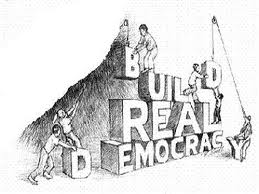Slowly but surely democracy is spreading and finding roots around the world. The latest countries to begin their path towards democratic governance are Tunisia and Libya. In both countries, democratic elections were held to fill the void left by the toppling of a tyrannical dictator.
Looking at a map of the world that demarcates democratic governance, there is clearly a trend since the end of the second world war for democracy to find its way into countries that were anything but. Central America, the former Soviet Union, and now North Africa have all experienced the incursion of what is becoming the only legitimate form of governance.
Related Posts
Unfortunately, there is also the tendency for former and present day imperial powers, the United Kingdom and the United States of America, to pass themselves off as democracies by equating popular elections with democratic governance. In reality, they are nothing more than plutocracies.
As a result, the persistent presence of the democratic myth has taken in the vast majority of each country's respective citizens, making it such that those who protest the absence of truly democratic political institutions are marginalized.
In the case of the UK, the plutocracy is anchored in the wealth and privilege brought on by a steadfast adherence to tradition and custom rooted in time immemorial. It as though the British are stuck in the eighteenth century, unable to reform their unelected upper house, the House of Lords, more than one hundred years after declaring the intention of doing so. Moreover, the Brits actually refused to abandon the first-past-the-post voting system by way of a national referendum despite its well known propensity to distort the popular vote so that majority governments are manufactured for the benefit of a minority of the electorate.
In the United States, the plutocracy is supported by a political system that empowers the financial sector and the corporate class at the expense of everyone else. Despite the lofty enlightenment rhetoric of its founding fathers, the privileged persons who wield the most power are in fact the nation's corporations, which were, in fact, granted the legal status of a rights holding person by the US Supreme Court. Consequently, corporations can make unlimited financial contributions to political campaigns, which is tantamount to buying an election, thereby making mockery of the so called democratic process.
Fundamentally, both countries adhere to culturally held beliefs that stem from the Protestant Reformation, and as Max Weber pointed out the cultural consequences of Calvinism run deep. So much so that the religious belief in the divine separation of the Elect and the dammed manifests itself socially in the rampant inequalities that would have people believe that the poor and the oppressed are responsible for their lot and deserve their divinely ordained suffering. Wealth, on the other hand, is a sign of being favored by God.
Contrary to the perverse inequality of those who believe that they are members of the Elect, democracy is an ideology founded on a radical conception of equality: equality at birth, equality of rights, equality of the vote, and equality before the courts. This is not the ideology that supports the inherent inequality favored by those who desire an ostentatious display of wealth that suggests a divinely inspired sense of their superiority.
As Machiavelli so aptly observed at the beginning of the Renaissance, in order for the Republic to come about, men must love the Republic more than they love their souls.
This is certainly not the case in either country where the radical individualism nascent in widespread historical religious belief found the fertile ground of the radical individualism associated with Anglo-American capitalism.
Americans and the Brits may have become less enamored with their souls, but not with the status hierarchy that wealth brings about. The pursuit of happiness in each country is in reality the pursuit of wealth, and since this obsession is at the core of Anglo-American culture, any ideology that is inherently egalitarian like democracy must be avoided at all costs.
So, in the end, a combination of the myth of democratic governance and the cultural beliefs that require large inequalities make the Anglo-American empire impervious to real democratic reform with the exception of Australia and New Zealand, two countries that have transcended the limitations of the Westminster parliamentry system and Anglo-American culture.
A fish doesn't think about the water that surrounds it, and as long as there are fortunes to be made not a lot of serious thought will be devoted to bringing about democracy in either the US or the UK.





















